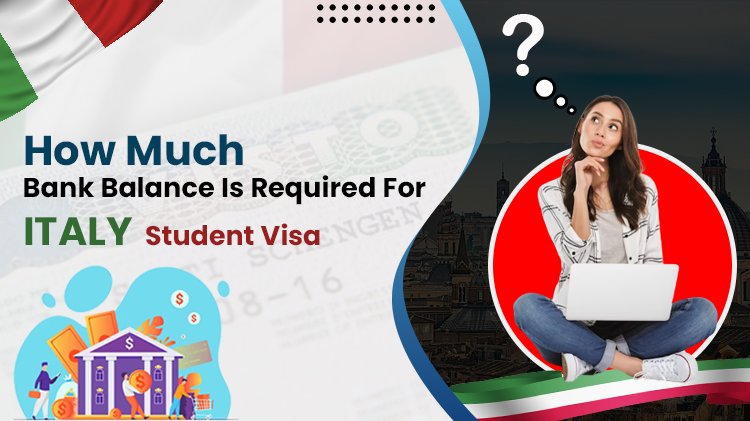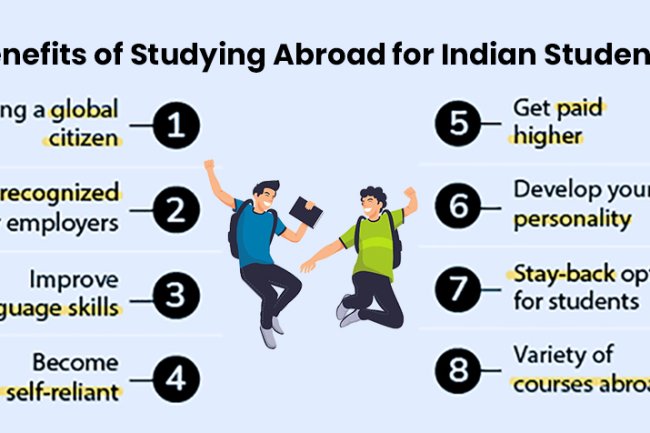How Much Bank Balance Is Required For Italy Student Visa

For overseas students wishing to continue their education in Italy, applying for a student visa is a necessary first step. Having enough money to finance your stay in the nation must be shown as one of the main criteria when applying for a visa. To better comprehend the financial component of the visa application, we'll go into detail in this blog post about the bank balance needed for an Italy student visa.
Understanding Financial Requirements:
In order to be granted a student visa for Italy, you must demonstrate that you have the money to pay for your tuition, living costs, and other associated charges over the course of your studies. Making sure you can support yourself prevents you from becoming a burden on society or the Italian government.
Required Bank Balance:
Depending on a number of variables, such as the length of your course, the location of your institution, and your housing arrangements, the precise amount of bank balance required for an Italy student visa may change. As of the day this blog was published, it is generally recommended for students who are studying in Italy to have a minimum bank balance of €5,944 annually.
Tuition Fees:
In addition to the requirement for a bank account, you must carefully assess the institution's tuition costs. You must show that you have the money to pay for your tuition for the entire length of the course. Depending on the university, programme, and level of study, the actual sum varies.
Proof of Funds:
You will normally be required to present supporting documentation, such as bank statements or a bank certificate, to demonstrate your financial capability. The statements must show the required bank amount and should cover a certain time frame, often the last six months. Make sure the documents are in English or that an official translation is included.
Additional Financial help:
You must give proof of any additional financial aid you may get, including any scholarships, sponsorships, or parental help, if you are eligible. This can support your immigration application and allay any worries about your ability to support yourself.
Currency Conversion:
Since euros (€) are Italy's official currency, it is crucial to convert foreign currencies before submitting bank statements or certificates. For the most precise conversion rates, check with your bank or use trusted currency exchange websites or can consult counsellors at university bureau.
Financial Planning:
It's crucial to put together a thorough financial plan before applying for a student visa to Italy. Take into account all of your costs, including those for lodging, travel, healthcare, food, books, and other personal expenses. Planning your finances wisely will make sure you have enough money to live comfortably while you are a student.
Letters of Loan or Sponsorship:
Students sometimes need loans or sponsorships to pay for their education. You must submit the necessary paperwork, such as loan approval letters or sponsorship letters, to support your visa application if you are using a loan or have a sponsor.
Conclusion:
Pay close attention to the financial requirements if you want to obtain an Italy student visa. It's vital to prove that you have enough money in the bank and the means to pay your tuition and living expenses. You can improve your chances of receiving a student visa by comprehending the bank balance criteria, making a careful financial strategy, and providing accurate supporting documentation. Keep in mind that the most recent details on visa requirements and financial obligations can be found on the official website of the Italian embassy or consulate in your nation.
FAQs
1. What is the minimum bank balance needed to obtain an Italian student visa?
For students studying in Italy, the typical recommendation is to maintain a minimum bank balance of €5,944 annually.
2. How is the necessary bank balance calculated?
The precise sum may change based on details like your course's length, location, and housing arrangements.
3. Can I present my native country's bank balance?
Yes, provided that it fulfils the requisite amount and is accompanied by the necessary documentation, you may provide a bank balance from your native country.
4. What does the minimum bank balance requirement serve?
The prerequisite makes sure you have enough money to pay for your tuition, living costs, and other associated expenditures while you are pursuing your studies in Italy.
5. Can I count grants or sponsorships towards my bank balance?
Yes, you are allowed to count scholarships or sponsorships as extra funding, but you must still have the minimum required bank balance.
6. How can I demonstrate my bank balance?
You must present bank statements or a bank certificate that amply demonstrates your account balance for a given time frame, usually the last six months.
7. Can I present a joint bank statement with a relative?
A joint account statement is appropriate as long as your name is mentioned clearly and it is possible to identify your share of the cash.
8. Can I utilise a loan or financing for my schooling as evidence of my finances?
As long as you submit the required paperwork, such as sponsorship letters or loan approval letters, loans or other forms of financial aid will be taken into consideration.
9. Are there any special guidelines for converting currencies?
Given that euros (€) are Italy's official currency, it is crucial to translate any bank statements or certifications into euros (€).
10. Do I have to submit bank statements throughout the full course period?
In most cases, bank records from the previous six months are sufficient. It's crucial to check with the embassy or consulate because precise regulations could change.
11. Can I provide proof of funds using a fixed deposit or savings account?
Yes, as long as they are easily available and can be withdrawn if necessary, fixed deposits or savings accounts can be used as proof of funds.
12. Is there a certain format for the certificate or bank statements?
The certificate or bank statements must be written in English or include an official translation. The structure should make your name, account information, and balance very apparent.
13. Can I submit my parents' or sponsors' bank statements?
Along with a sponsorship letter outlining their commitment to paying for your education, your bank statements from your sponsors or parents should be sent if they are paying for your education.
14. Is there a minimum bank balance requirement for a certain age?
For most age groups, the bank balance requirement is the same. It's crucial to check with the embassy or consulate because precise regulations could change.
15. Can I meet the needed balance by using more than one bank account?
Yes, provided that the total balance of all the accounts is equal to or more than the requisite amount.
16. Are there differences between the bank balance requirements for undergraduate and graduate students?
Generally speaking, the bank balance requirement is the same regardless of education level. It's best to confirm any precise requirements with the embassy or consulate, though.
17. Can I include earnings from side hustles or internships in my bank account?
Part-time income or earnings from internships are typically not counted towards the minimum bank balance requirement. It is advised to display adequate funds in your bank account.
18. Can I omit the bank statements and instead submit an affidavit of financial support?
The recommended method of proving the required bank balance is through bank statements. However, if an affidavit of financial support includes specific information about your financial condition, it may be taken into consideration.
19. Is the minimum bank balance requirement flexible?
The minimum bank balance requirement is a moving target. The Italian embassy or consulate should be contacted for the most recent information.
20. How far in advance should I set up the necessary bank balance before requesting a student visa?
It is best to set up the requisite bank balance much in advance, making sure you have enough money set aside for at least six months before completing your visa application.
What's Your Reaction?





















